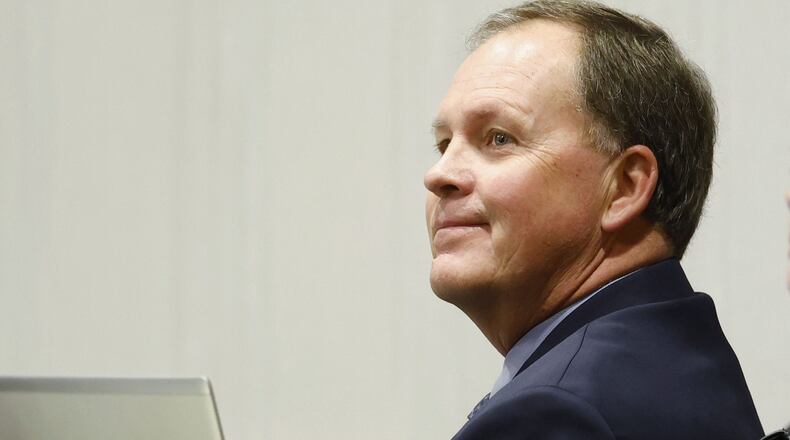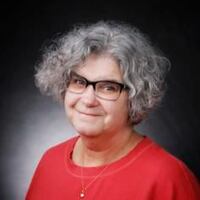>> SIGN UP FOR THE JOURNAL’S CRIME & SAFETY REPORT EMAIL NEWSLETTER
Prosecutors from the Ohio Attorney General’s Office say Reynolds spearheaded a plan for a developer to expand a housing development, Liberty Grand Village, and said land owned by Gerald Parks, his father’s neighbor, would be a good fit. It was part of a couple of land development deals Reynolds tried to leverage while county auditor, prosecutors say.
Reynolds has maintained his innocence and said the charges are part of a political witch hunt and he spoke out about projects as a private citizen.
Credit: Nick Graham
Credit: Nick Graham
After a failed attempt to purchase 15 acres of the Parks property for $475,000 when the neighbor told Reynolds the land was not for sale, Reynolds opposed a later development plan on the same land, according to prosecutors.
In 2019, a deal for the same track of land did not come to fruition after Reynolds, speaking for his father, said he had problems with the development, including density, road access and “lack of green space.”
That’s when Reynolds offered up a solution of purchasing 2.8 acres of his father’s property for $500,000. And later he made a third attempt to make a case for the development by asking for a “consulting” fee of $200,000 and saying he would support the development and “get it through,” according to prosecutors.
Those development partners, Brian Jimenez and Tim Haid, testified for hours Wednesday and Thursday, both saying they declined to purchase the Reynolds property because they felt they had enough green space, couldn’t afford it and it did not want to add to the project.
“We were kind of caught off-guard that it didn’t have enough green space. It was less density than Liberty Grand Village (also on Hamilton-Mason Road),” Jimenez testified.
Jimenez said as a result they decided to get out of the contract option on the Parks property because “Reynolds is a very influential individual — he is a county auditor — if he was going against us, we thought we would not prevail.”
Haid testified, “He (Reynolds) said he would use his political capital to fight it all the way through zoning.”
Prosecutors showed the jury an email from October 2019 from Haid to the developers’ attorney stating to notify Parks that they would not move forward with the project because “Park’s property is going against zoning and the county auditor whose dad owns adjacent property said he wouldn’t support the rezoning land use (and) use his political capital to fight it unless we purchased 2 acres from him for half a million dollars.”
During cross examination, Haid admitted he nor his partner contacted law enforcement about Reynolds statement that may have been improper. It was law enforcement that contacted them to open an investigation.
In 2021, Jimenez was contacted again by Reynolds about securing approval of a Tax Increment Financing proposal to provide public funding from three government entities for infrastructure and improvements to Hamilton-Mason Road to benefit a pending development on his father’s property and the potential development on the same Parks property.
Credit: Nick Graham
Credit: Nick Graham
Again, Reynolds called Jimenez’s development a “perfect fit” for the Parks property, but at that time they did not own the property and or have it under contract, Jimenez said. There was no mention by Reynolds this time of green space, density and road access.
By then other developers were looking to build on the Reynolds and Parks property, both housing for senior living developments. Prosecutors say Reynolds was trying to stop the rival development on the Parks property that’s why he was courting Jimenez and Haid to try their development again.
Jimenez said Reynolds told them together the development on his father’s land and their development of the Parks property would be a better funding source for the TIF. He said Reynolds said for a $200,000 consulting fee he could use his influence and get both project through zoning.
Haid testified Reynolds said for the consulting fee he would support the project at zoning and he “felt confident” he could block development pending zoning approval on the Parks project. That would clear the way for them to work together on TIF funding.
The defense pointed out many residents, township trustees spoke out about that failed proposed project on the Parks land because the buildings were three stories.
Both men testified they had no intention of paying Reynolds any consulting fee, but were still open to conversation with Reynolds “because we didn’t want to tick him off.”
A later conversation with Reynolds was recorded “to protect ourselves” if they were ever accused of accepting a bribe, Jimenez said. In that conversation, the $200,000 fee was never mentioned, but Jimenez said he made reference to past conversations and “getting something done.”
Defense attorney Chad Ziepel said the $200,000 was not a consulting fee, but an offer from Reynolds to give a developer sewer access from his father’s property. During the conversation, Reynolds does make reference to getting sewers to the development and “they need to work together.”
Both developers testified, Reynolds never “guaranteed” or “promised” he could get zoning approved on the projects.
Ziepel drove home that county auditors don’t control or authorize developments, county auditors don’t control or authorize zoning and don’t authorize TIF agreements. And Reynolds had a right to speak as a private citizen at township meetings.
Haid testified that in all the conversations he had with Reynolds he never indicated he was the county.
FOLLOW THE COVERAGE
The following are previous articles covering the criminal trial of indicted Butler County Auditor Roger Reynolds:
About the Author



